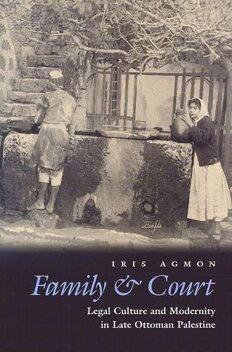
Family & Court: Legal Culture And Modernity in Late Ottoman Palestine (Middle East Beyond Dominant Paradigms) PDF
286 Pages·2005·12.856 MB·English
Most books are stored in the elastic cloud where traffic is expensive. For this reason, we have a limit on daily download.
Preview Family & Court: Legal Culture And Modernity in Late Ottoman Palestine (Middle East Beyond Dominant Paradigms)
Description:
Challenges prevailing assumptions about family, courts of law, and the nature of modernity in Muslim societies against the backdrop of Haifa and Jaffa during " the long nineteenth century." The popular image of the family and the court of law in Muslim societies is one of traditional, unchanging social frameworks. Iris Agmon suggests an entirely different view, grounded in a detailed study of nineteenth-century Ottoman court records from the flourishing Palestinian port cities of Haifa and Jaffa. She depicts the shari'a Muslim court of law as a dynamic institution, capable of adapting to rapid and profound social changes - indeed, of playing an active role in generating these changes. Court and family interact and transform themselves, each other, and the society of which they form part. Agmon's book is a significant contribution to scholarship on both family history and legal culture in the social history of the Middle East.
See more
The list of books you might like
Most books are stored in the elastic cloud where traffic is expensive. For this reason, we have a limit on daily download.
